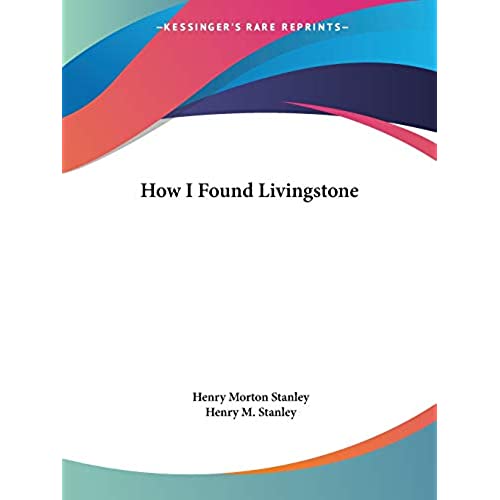

How I Found Livingstone
-

Edwin Keck
> 3 dayHow I Found Livingstone; travels, adventures, and discoveries in Central Africa, including an account of… By Henry M. (Henry Morton) Stanley The book starts when Mr. Stanley (for short) was sent by the manager of the “New York Herald”, Mr. Bennett James Gordon, on a journey to get news and perhaps bring back Dr. Livingstone , circa 1870-1871. Preparation for such a journey began in Zanzibar and had to be thought out and planned. The trip seems to go through endless country with interesting views and experiences, Such as one would encounter in the vastness of Africa .They paid tariffs to the tribal chiefs along the way by taking portions from rolls of cloth and beads they had brought with them to give to the chiefs. The caravan could go no further than Unyanyembe because of an impending war brought on by Mirambo a renegade chieftain. It was heard that Livingston had traveled that way and it was hoped that he may have passed that way before the hostilities began. A band of Arabs was sent out to war against the renegade tribe but were unsuccessful and had to retreat. After traveling West they had to go West via a Southern route and arrived at Ujiji where Dr. Livingston was reported to be. Travel was accomplished by caravan hiking maybe 10 or 15 miles per day and then camping by night. Although Dr. Livingstone made missionary travels, his later ambition was to find the head waters of the Nile . Dr. Livingston discovered that the Chambezi river what the most southern tributary of the Nile. The book gives account of Dr. Livingston’s explorations as far back as 1866. Lake Tanganika being the Southern most reservoir of the Nile was explored by Mr. Stanley and Dr. Livingstone before Mr. Stanley returned to Zanzibar. When in Zanzibar Mr. Stanley was to gather up men and arms for Livingston’s continued exploration as he was in need of porters. Dr. Livingston had ambition of searching out the source of the Nile before he considered returning to civilization. The description of the country side leaves one in awe as to the beauty and vistas that Africa offers. The different obsticles they encountered and overcoming them keeps one riveted to the book.
-

Mark Clay Grove
> 3 dayMy favorite nonfiction read of 2013. It is indelibly imprinted on my mind. First person narrative of firsthand accounts from the British Colonial Period are absolutely fascinating.
-

Kindle Customer
Greater than one weekI liked it for the history, not sure about its entertainment value for the non history buff.
-

L. P.
> 3 dayStanley is a very detailed narrator, his thick prose has way too much verbiage in most of the book. However, its one-of-a-kind story, worth reading for those who venture into historic colonial days in the 1800s.
-

Claud Homenick
Greater than one weeknot impressed
-

sue Barker
> 3 dayThis is a really interesting book worthy of your reading, and very informative. I really like reading about missionaries from early times in history and what all they went through on little or nothing.
-

Andrew Townsend
> 3 dayFor someone who has an Africa upbringing, a map of his travels would have been helpful , very few of the tribes or chiefs were necessary to the story. It is interesting that the Arabs dominated so many of the tribes near the east coast of Africa. Yet the British and Americans have all taken the blame.
-

James Larsen
Greater than one weekThis is Mr Stanleys accurate account of his travails in Africa, and it is never what you think. The bugs, the people, the muck, not the animals. Also an insight into the medical ignorance of the day. Learn the real value of cloth in Dotis. Yes folks, money in Africa was carried in bales....cloth. Dr Livingston really really could have used google earth and penicillin, but alas....
-

bichonandon
> 3 dayHenry Stanley was a muckraking journalist for the New York Herald, when he was given the assignment of his career: Find Livingstone! by telegram. Dr. Livingstone was a long lost English missionary-turned-explorer, whose obsession with finding the beginning of the Nile consumed his life in later years. Finding Dr Livingstone, in turn became Stanleys obsession. Stanleys writing spares nobody; not even himself. Incapable of hiding his characteristic arrogance, he freely describes everything he does and sees while trekking through Africa. Call him what you will, but in his dogged determination to effect his goal, he exhibits more courage and tenacity than most explorers of his time. He regularly doles out beatings for thievery and the like, while navigating his caravan through warring tribes, unforgiving weather, and deadly jungles. He takes joy in shooting the animals of Africa, and recounts his hunts with conceited pomp. Yet one cannot help but admire his ability to pilot all of the intense scenes in which one mistake on his part could mean death for himself and his whole team. This book, downloaded to my kindle phone app, had no pictures or maps. It is one of the few books I will happily read again, and I was sorry to see it end.
-

Seneca
> 3 dayThough no longer the sensational best-seller it was at the time it was published, the book remains well-worth reading. I was particularly impressed by the authors determination and ability to overcome the most formidable obstacles. As Stanley himself put it, “where the civilized white is found, a difficulty must vanish. What a contrast with the present, when almost every time the armed forces of Western nations try to do something in the so-called Third World they are defeated and expelled
